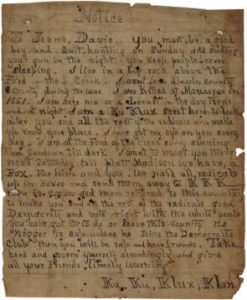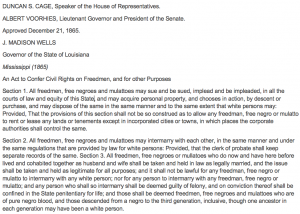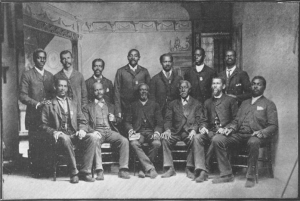Threat From the Ku Klux Klan, 1868

This image is a hand written letter from a member of the Ku Klux Klan to a “radical” . The letter was addressed to an African American republican by the name of Davie James who had recently been elected as sheriff of the county. The letter written from the Klansman threatens James life by glorifying the horrendous actions that have been committed by the KKK previously. He lets him know personally that he is watching everything that he does. This letter represents one of the most outwardly explicit ways that white people and white males in particular resisted post slavery changes. The actions taken by this organization surpassed many of the other legal and social efforts because it claimed the lives of so many African Americans and often glorified these murders as a badge of honor. This group represented the Confederacy and their primary goals involved terrorizing African Americans. This method of indoctrinating inferiority onto African Americans psychologically and physically impacted the black community and instilled long term fears and contempt between black and white southerners.
“Black Codes (1865)” Oxford African American Studies Center

This excerpt includes Section 1 and Section 2 of legislation enacted in Louisiana in 1865 better known as “Black Codes”. Although the civil war had ended and slavery was technically over this did not mean that all members of society were ready to accept this change, especially not white southerners. Many southern states began enacting such codes that regulated the freedom, opportunities of employment and voting rights of recently freed slaves. Essentially, creating a new form of slavery that continued the subordination of black citizens and allowed financial, social and legislative power to remain in the hands of white men. The ways in which these laws were set up made it nearly impossible for these standards to change. Barring African American citizens from several opportunities took away theses citizens voices in society but also restricted their own regulation over their own lives.
Black Deacons in Savannah, Georgia

Following the end of the civil war African Americans still possessed little to know rights to education. Often, churches served as both a place for worship but also a place to learn. The black men showcased in this image were all deacons in Savannah, Georgia in 1888. The church served as a successful facilitator of education for freed slaves as it gave them a chance to become pastors and deacons. After the Emancipation Proclamation African Americans opportunities too become educated outside of religion grew.Many schools developed often having religious leaders such as pastors or deacons at the forefront. Despite its progression education did not forfeit black citizens economic growth or even social progress. Whites fought hard to maintain that black citizens lacked the knowledge to enhance there financial and social circumstances. Withholding knowledge from African American citizens is one of the key ways in which white leaders maintained the status quo.
